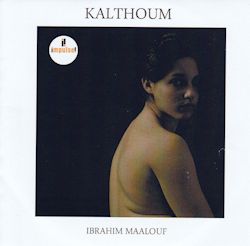-
Introduction - Alf Leila Wa Leila
-
Overture I - Alf Leila Wa Leila
-
Overture II - Alf Leila Wa Leila
-
Movement I - Alf Leila Wa Leila
-
Movement II - Alf Leila Wa Leila
-
Movement III - Alf Leila Wa Leila
-
Movement IV - Alf Leila Wa Leila
Ibrahim Maalouf - Trumpet
Mark Turner - Tenor sax
Frank Woeste - Piano
Larry Grenadier - Double bass
Clarence Penn - Drums
I hadn't come across the Paris-based trumpet player, composer, arranger and jazz educator, Ibrahim Maalouf, before listening to this CD. It seems I
was missing out. Lebanese-born Maalouf here is joined by three considerable American musicians (Turner, Grenadier and Penn) and the prize-winning
German pianist, Frank Woeste. Together they have produced a fascinating disc. The album is named in tribute to the Egyptian singer, songwriter and
film actress, Oum Kalthoum. She died in 1975, having established a reputation as one of the finest (and most treasured) singers in the Arab world.
The title of the suite written by Maalouf in her honour, Alf Leila Wa Leila, apparently means 'One Thousand And One Nights', harking back
to her 1969 recording of that name. One of the distinguishing characteristics of Maalouf 's style is
his penchant for playing Arabic music with quarter notes on the trumpet, following the example of his father Nassim, also a musician. The American
Don Ellis, important in the free jazz movement, but who was also intrigued by Near Eastern music, used a quarter tone trumpet from 1965 onwards.
Using a specially adapted horn, with four valves instead of three, can offer more subtlety and flexibility in the context of traditional Arabic
melodic modes.
These days, the boundaries between world music and jazz are porous and this recording is an excellent illustration of that reality. Ibrahim Maalouf
has written music for films as well as across a wide range of genres. Let no one doubt the jazz credentials of the music on this album, however.
Take, for instance, Movement III, the longest track on the disc at over 15 minutes. This is genuinely exciting and urgent jazz with fierce
interplay between trumpet and tenor sax, impressively supported by the rhythm section. A real foot-tapper, in fact. Maalouf takes the listener's
breath away (not to mention his own!) with some superb trumpet playing at high speed. Maalouf's incredible technique can be appreciated, too, on Movement IV where he can be heard in intricate pursuit of the melody. There is remarkable empathy between Maalouf and Turner while
Clarence Penn is energetic and effective on the drums. Woeste and Grenadier complete a line-up thoroughly at home with one another. There are also
some interesting changes on this track with a tendency to virtually come to a halt before sweeping back into the theme with renewed vigour. At
times, it's almost as if two different styles of music are present. I've highlighted these tracks in particular but there's lots of quality to be
found throughout the CD. Another example might be Movement I, which conveys at first a sense of sadness and depth of feeling, dispersed by
a sudden change of tempo and an almost joyful conclusion from the trumpet.
This is a fascinating album, in terms of performance, writing and coherence. I suspect that I'll be returning to it often. Maalouf and indeed
pianist, Frank Woeste, the other musician new to me, prove to be real finds.
James Poore
